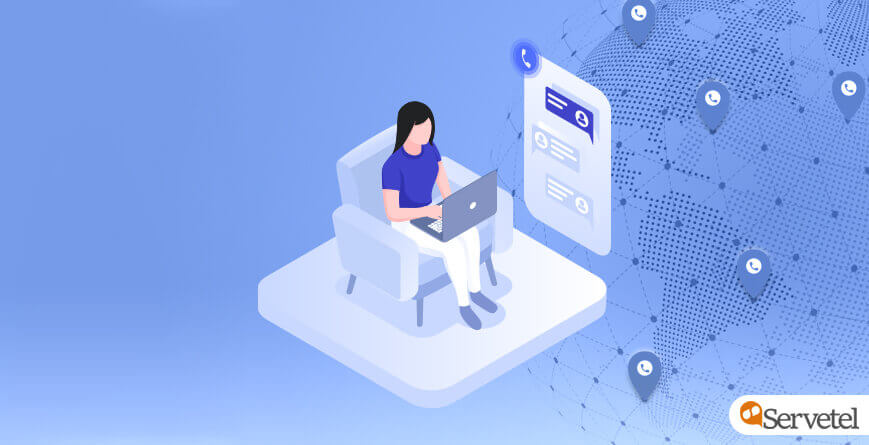Let’s say, you are in a long meeting and don’t want to be disturbed. But you’re also expecting an important call from a client that you just can’t afford to miss. What do you do?
Simple—you redirect the incoming call to an alternate number that belongs to a colleague or a supervisor and let them handle it while you get done with your ongoing meeting.
The call forwarding feature lets you stay connected at all times, no matter your circumstances, location or time zone.
Thus, whether your company is an enterprise or a start-up waiting to spread its wings, the call forwarding feature can improve the customer experience your business delivers by leaps and bounds.
Why is call forwarding a must-have feature?
According to Microsoft, about 36% of customers agree that the most frustrating aspect of a bad customer service interaction is their inability to resolve issues quickly.
Call forwarding ensures your customers get quick and reliable customer service without any delays. It can be enabled in both traditional and cloud-powered phone systems and help you stay connected with your customers round the clock.
Furthermore, with constant advancements in technology, you can also enable call forwarding on a single smartphone and avail its benefits anywhere, anytime.
Call forwarding also comes with additional benefits like call recording and call routing, which help you track and analyze data and route calls accordingly.
It’s not surprising then that different industries have embraced call forwarding as a standard feature.
So, how does call forwarding work?
In the beginning, call forwarding only meant redirecting incoming calls to another number. But ever-evolving technology now offers advanced settings that have redesigned the entire support experience.
When a customer tries to reach your business phone service provider, you receive an incoming call. This call then gets transferred to the destination number with the help of the call forwarding feature. Consequently, you can answer the call from anywhere, anytime, without making your customer wait.
The added perk?
You can set up call forwarding within minutes and get started instantly!
This feature comes with several options that allow you to customize how, when and to whom the calls are forwarded.
The call forwarding feature can be used in different ways and each brings its own benefits:
1. Call forwarding: You can forward all your incoming calls when you are away from your device or on an official break from work.
2. Call forwarding when busy: This call forwarding feature is useful when you’re expecting an important call. It forwards all incoming calls when you are speaking to someone else on the line.
3. Forwarding unanswered calls: You can enable this setting when you are in a meeting or in an arrangement where you may not be able to answer your phone.
4. Forwarding calls when you are unreachable: You can redirect calls when you’re in a low reception zone, have no phone signals or even if your phone’s battery is dead. This setting prevents you from missing any important calls.
How can call forwarding benefit your business?
Needless to say, call forwarding can enhance the customer experiences you offer.
Here are some additional advantages of call forwarding:
1. Improved customer service
The experience every caller has with your company’s customer service team has a huge impact on their overall journey.
According to Microsoft’s 2018’s State of Global Customer Service Report, 61% of customers say they’d stop doing business with a company after a poor customer service experience.
Though communication can be facilitated over a range of channels such as emails and chatbots, having an organised and effective support system on call is integral for every business.
When a call is being forwarded, some essential things to keep in mind are:
- Make sure the caller is connected to a relevant agent who can answer their queries
- In case of an international customer base, employ agents who are well versed with different languages and can offer support accordingly
2. No missed calls
Unlike earlier days when landlines were the only means of receiving and making calls, the advent of smartphones and fast-paced global Internet connections has transformed the current work scenario.
From missing important calls to receiving every call on your preferred device and location, the technology has come a long way. In fact, you can even forward business calls from office phones to home phones, providing employees flexibility and comfort levels like never before.
3. Cost-effectiveness
Enabling the call forwarding feature eliminates the need to invest in extra hardware. You can set up multiple phone lines at minimal expenditure using cloud technology and begin to use the feature soon after.
Another way call forwarding encourages cost-effectiveness in a business is by reducing the need for a special team that redirects calls based on callers’ needs.
All of this can be turned into an automated process that does not demand human intervention.
4. Dynamic work-life balance
If your employees are expecting a call post working hours, they can use the call forwarding feature to forward the call to a phone that is accessible to them off-premise
Similarly, call forwarding can be restricted to function only until a few hours after work so as to make sure employees don’t receive too many calls at odd times after they have left the workplace.
However, the call can be rerouted to the IVR system (self-service menu) so that your customers are not left with unsolved queries.
Advanced call forwarding features also include on-hold music, voicemail facilities and the ability to forward calls to multiple phone numbers at the same time.
5. Increased professionalism for the company
Customers highly appreciate companies that go the extra mile to cater to their needs and make them feel valued.
You can use call forwarding to extend support to your customers whenever they need it.
The added bonus?
You can look professional and enhance your credibility while doing so!
Call forwarding allows your customers to reach out to you via a business number on their end, even if you answer the call on your personal phone.
This not only makes you look professional but also adds convenience to your customers as they need not search for different numbers to contact you at any given point in time.
Moreover, your agents no longer need to give out their phone numbers to keep track of customer support services when away from the office.
Therefore, call forwarding helps you maintain professionalism during all your interactions even if they happen post working hours.
How to choose the right call forwarding service?
Each call forwarding service varies from another. While some may allow you to forward calls to unlimited phone numbers, others may come with an upper limit of the same.
Some other features to consider when choosing a call forwarding service include:
- The price of the service
- The ability to export calls
- Availability of advanced features such as call recording and call routing
- The system’s ability to maintain call history, etc.
Conclusion
In a nutshell, call forwarding ensures greater flexibility of business operations and improved communication for all organizations. It eliminates the need to work directly from the office and enables you to cater to your customer’s needs from anywhere.
With a turbulent increase in hybrid working trends, more and more companies are opting for call forwarding as it allows their employees to stay productive from anywhere around the globe.
No matter how large the scale of a business is, always being present to attend to your customer’s problems and demands is a must.
Try Acefone’s cloud telephony solutions today. Contact now.














